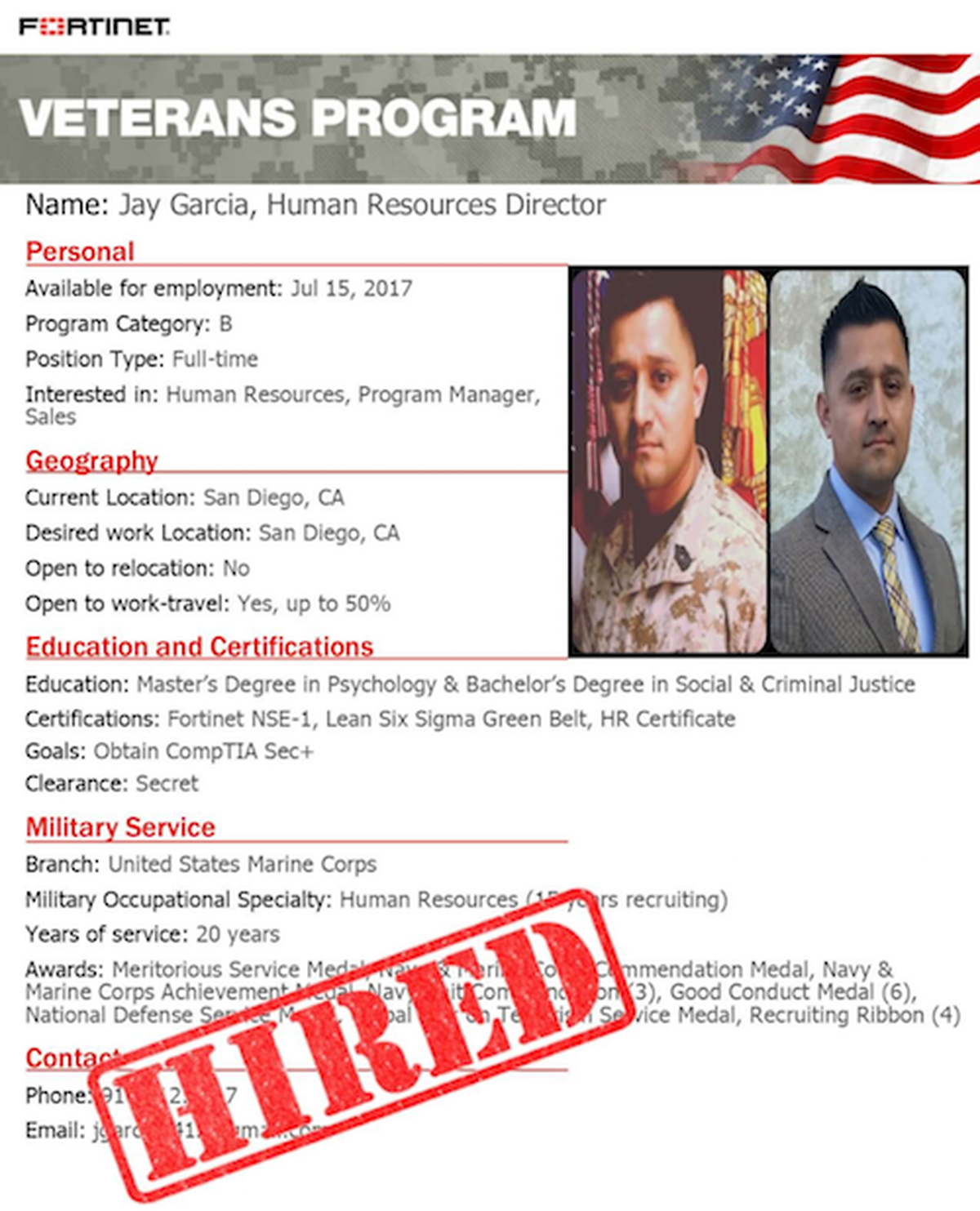As technology usage expands across the globe, so too does the threat landscape and the number of attackers looking to disrupt services and steal data for financial gain. As a result, there is a greater need than ever for qualified cybersecurity professionals that have the abilities necessary to detect and mitigate potentially damaging threats.
However, as many in the technology industry are aware, there is a severe lack of qualified professionals who can fill the jobs in place to prevent data breaches. In fact, according to recent ISACA data, “there will be a global shortage of two million cybersecurity professionals by 2019.”
Statistics like these have caused organizations and individuals to take action. Fortinet is one such organization that’s put programs in place to help fill these voids and, at the same time, help others along the way. The FortiVet program is working to bridge the gap between the supply of veterans looking for post-service work and the need for qualified professionals across the cybersecurity industry.
Bridging the Gap with the FortiVet Program
The path from the military to the world of cybersecurity may not seem straightforward, and military veterans do not always leave the service with a wealth of technical experience. However, it’s the skill set that extends well beyond tech that makes them extremely attractive candidates for cybersecurity professional roles.

Jay Garcia is a prime example of a military veteran that came out of the service without much technical experience, but an abundance of other valuable qualifications that have allowed him to flourish within the space.
Prior to joining Fortinet, Garcia served 20 years in the Marine Corps. Upon retirement, he was integrated into the Work for Warriors program, which helps veterans secure careers outside the military. Work for Warriors was aware of the FortiVet program and connected Garcia with a primary contact, who set him up with an interview for a role within the FortiVet program. Garcia passed through a series of interviews before landing his post-military position and credits much of his success to his unique skill set that was obtained throughout his military career.
In the military, Garcia was a career recruiter for 15 of his 20 years, which helped him develop an expertise in management. This recruiting and management experience directly correlates to the HR realm of cybersecurity, as he is knowledgeable about where to look for skilled workers and excels in creating awareness around the need for cybersecurity.
As part of his role at Fortinet, Jay frequents military bases with the goal of educating service members, creating awareness, and conducting cyber briefs.
Impact of the FortiVet Program
The FortiVet program was first focused on the Marines in Camp Pendleton, which was followed by a couple of briefs on the Hawaiian Islands. Since stepping onboard as a leader of the program in July 2017, Jay and the team have seen a 400% uplift in the number of bases they can access, which has helped to spread the word through the United States and even into Canada and the United Kingdom. In this same six-month timeframe, the FortiVet program has assisted 14 retired service members land jobs with Fortinet partners in the cybersecurity industry.
Prior to Garcia’s work with Fortinet, a small number of service members and key players at military organizations knew of the company and its initiative. Thanks to the hard work of Garcia and the FortiVet team, it’s now common for service members to know of the company and program, which leads to a number of referrals coming through the door.
Additionally, Garcia and other program leaders frequent military bases to conduct cyber briefs and inform communications teams about the possible threats they’re faced with. From there, they typically place service members into training programs to expand their skillset and better prepare them for defense.
Fortinet has learned to how to capitalize on relatable skills for the benefit of the veteran, by helping veterans translate their skills into civilian applications during their conversations with employers.
Relatable Skills
- Force Protection & Situational Awareness
- Diversity & Inclusion in action
- Structure leadership training
- Character – Triumph over adversity
The role of the FortiVet program doesn’t start and stop with filling open cybersecurity positions. Garcia and team also have mentorship programs in place that help service members transition from the service to the cybersecurity industry. This mentorship oftentimes comes in the form of helping the service members prepare for upcoming interviews with Fortinet partners. Garcia and his team’s efforts have encouraged service members, including those with very little foundational knowledge about cybersecurity, to explore careers in the industry and land opportunities.
Partners can view current FortiVets for no fee and there is no fee for veterans to sign up. As the cybersecurity skills gap continues to widen, programs like FortiVet will help to bridge that gap while also providing veterans with fruitful post-service careers and the sense of purpose they will likely miss from their time in military service.
Stephan Tallent is senior director of MSSP and service enablement at Fortinet.




